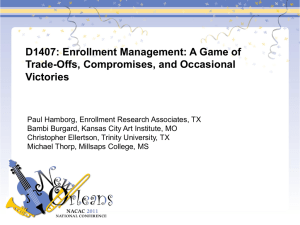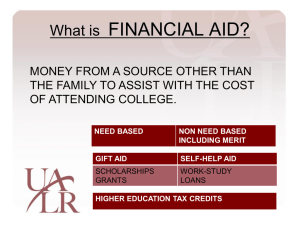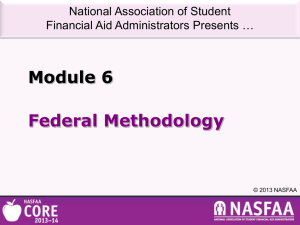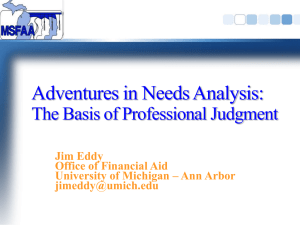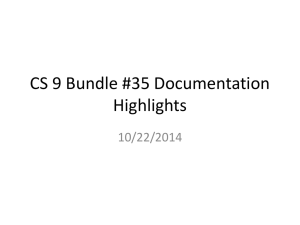Presentation Jesper Engdahl - GINA
advertisement
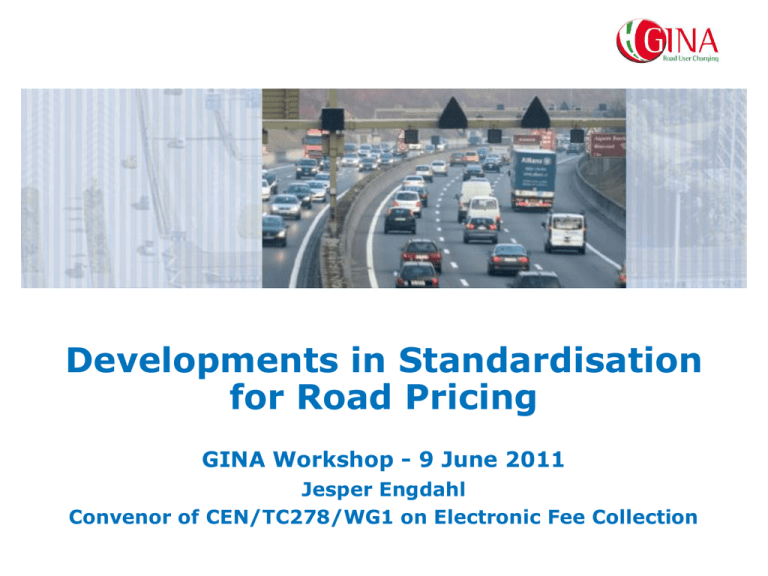
Developments in Standardisation for Road Pricing GINA Workshop - 9 June 2011 Jesper Engdahl Convenor of CEN/TC278/WG1 on Electronic Fee Collection EFC standardisation - background • What is a standard? - • 1 A document approved by recognized body (CEN, ISO etc) Voluntary in application Intended for repeated use Benefits – support for agreements - Interoperability of products and services - Open and competitive market development Standards are more stable and enjoy broader market acceptance than project / industry specifications GINA workshop, Lyon, 9 June 2011 What support do EFC standards bring? Technical tool-box standards • • Necessary but not sufficient basis for compatibility Why? Changing requirements, evolving or changing technology, lack of experiences, lack of common view Interoperable application profile (“IAP”) standards • Coherent selection of choices in underlying base standards – sufficient basis for compatibility • Based on common policies and services agreed/defined by stakeholders Test standards • Assessment of conformity to specification Maintenance of standards 2 GINA workshop, Lyon, 9 June 2011 Overview – EFC related standards Architecture & technology independent • System architecture, information exchange, security guidelines, charging performance, non-metallised windscreen aperture Dedicated short-range communication (DSRC)-based EFC • DSRC, application data, functions, security and tests Autonomous EFC • 3 Charging, communication, update, roaming, compliance checking and localisation support GINA workshop, Lyon, 9 June 2011 GPS Architecture & technology independent - status • 7 standards - • • 4 ISO 17573, FprEN ISO FDIS 12855, TR 16092, TR 16152, TR 16040, TR 16219, TS 17574 Need for more work on technical standards? - Security Framework - ongoing - Test standards for Information exchange (12855)? - Profiles for Information exchange? Other needs? - Consensus processes between stakeholders - Contractual agreements, experiences GINA workshop, Lyon, 9 June 2011 DSRC-based EFC - status • 6 standards - • • Need for more work on technical standards? - Security Framework – ongoing - Charging performance – started Overall - 5 EN ISO 14906, TS 14907-1/2, EN 15509, EN 15876-1/2 Most standardisation work is done GINA workshop, Lyon, 9 June 2011 Autonomous EFC - status • 18 standards - • • Need for more work on technical standards? - Interoperability application profiles - ongoing - Security Framework - ongoing - Charging performance – started Other needs? - • Consensus processes between stakeholders GPS Overall - 6 TS 17575-1/2/3/4, TS 16407-1/2, TS 16401-1/2, TS 16410-1/2, TS 164031/2, TS 12813, TS 13143-1/2, TS 13141, TS 13140-1/2 Set of base standards finalised Need to update the first editions based on experiences from the field GINA workshop, Lyon, 9 June 2011 EFC application standards overview Tests Frameworks DSRC-based EFC Requirements 14907-1 Test Procedures EFC-tech. independent Autonomous-EFC Requirements Tests 17575-1/2/3/4 AID Auto.-EFC XXXXX 17575-Test 17573 EFC Architecture 17574 Security Profiles Security framework Toolboxes 14907-2 DSRC-OBU Tests 14906 AID for DSRC-EFC 12855 Info Exchange Charging performance 25110 AID, IC-cards Secure monitoring / Trusted recorder Profiles 15876-1/2 IAP Test Technical Reports 15509 IAP for DSRC-EFC TR 16040 Urban DSRC systems IAP for Auto-EFC TR First Mount OBE TR 16092 Pre-Paid Req. TR Value Added Serv. 7 GINA workshop, Lyon, 9 June 2011 12813 CCC for Auto-EFC 13143-1 (/2) CCC Test 13141 LAC for Auto-EFC 13140-1 (/2) LAC Test EFC standards and the European Electronic Toll Service (EETS) • Not the same scope - EETS is a single service - EFC standards support broader technical needs • EFC standardisation supports the EETS - by providing technical building blocks… - … but does not have the task to deliver ”turn key” standards for the EETS - ... this is up to the owner of the EETS - non-technical aspects are outside the scope of CEN • Legislators decide on the legal status of standards; EN 15509 “IAP for DSRC” is part of the EETS • EC’s Application Guide refers to the EFC standards - not legally binding 8 GINA workshop, Lyon, 9 June 2011 EFC standards - Summary Comprehensive set of EFC standards • • 21 published 9 subject to final approval Broad market acceptance • DSRC-based EFC: used in more than 40 countries, 140 systems, 50 mio vehicles… • Autonomous EFC: market under development Systematic review of published standards • • 9 Incorporation of lessons learnt and technology advancement ...relevant in particular for the autonomous EFC standards GINA workshop, Lyon, 9 June 2011 Want to know more or participate? Coordination of EFC standardisation : CEN/TC278/WG1 Jesper Engdahl, WG1 Convenor Rapp Trans AG Phone +41 61 335 78 53 e-mail: jesper.engdahl@rapp.ch 10 GINA workshop, Lyon, 9 June 2011 Johan Hedin, WG1 Secretary Hybris Konsult AB Phone: +46 8 658 15 25 e-mail: johan.hedin@hybris.se Is there a need for additional EFC standardisation? CEN continues to support the European Electronic Toll Service • Under preparation - IAP for autonomous systems (H2/2011) - Charging performance metrics (H2/2012) - Security framework (ditto) • Loose ideas for future standardisation - Secure monitoring and trusted recorder - Suitability for use testing support - EFC application on a cooperative ITS station platform ... but also broader stakeholder needs – what are your needs? 11 GINA workshop, Lyon, 9 June 2011 EETS and EFC standards EC co-financed work programme largely delivered • 14 published • 10 subject to formal vote – “Info exchange” and 9 test standards – publication expected by H2 / 2011 • 3 on-going – publication expected by H2/2012 27 CEN standards support the interface definitions of the EETS • DSRC-based (6 standards) • Autonomous systems (18 standards) • Technology independent (3 standards) EETS SP Interface 1 • • • DSRC charging data (EN 15509 + 15876-1/2) Compliance checking (TS 12813 + 13143-1/2) Localisation augmentation (TS 13141 + 13140-1/2) Interface 3 • 12 Toll declaration data, invoicing, exception handling, black lists and toll context data (prEN ISO 12855) GINA workshop, Lyon, 9 June 2011 EETS TC Reflections on challenges for the EETS • Governance : ownership and management of the service • Business case (EETS Service providers ...) • Scalability and complexity - Toll domain statements & Toll Chargers’ requirements - Service level agreements ... • Conformity to specifications and suitability for use - Conformity to specifications : harmonization between Member States? - Suitability for use : harmonization between Toll Chargers? - A golden common test bench could accelerate this process? 13 GINA workshop, Lyon, 9 June 2011 Overall programme of PTs • 12 PTs – 26 main deliverables • • • 3 European standards (ENs) 19 Technical specifications (TS) 4 Technical reports (TRs) • 4 PTs finished their tasks • 8 PTs active, 4 PTs recently launched - awaited progress on the autonomous reqs suite • Main deliverables – achievements to date • • • • 14 DSRC : 1 EN approved Autonomous : 4 TS published/approved Submitted for formal vote : 4 TS, 2 TR All works started, some are in an advanced stage GINA workshop, Lyon, 9 June 2011 Recent progress highlights (1) Interoperable application profile (IAP) for CEN DSRC • Testing standards (15876-1/2): Support for conformity evaluation and notified bodies • Part 1 Test suite structure and test purposes – “human readable part”: approved • Part 2 Abstract test suite – “machine readable part”: 5 months enquiry completed Application interface definition for autonomous systems (17575) • Part 1 “Charging” & Part 2 “Communication” : approved • Part 3 “Update” & Part 4 “Roaming” : submitted for formal vote • Testing – 2 WIs approved, 2 NWI proposals subject to approval; 4 draft NWI proposals 15 GINA workshop, Lyon, 9 June 2011 Recent progress highlights (2) OBE localization augmentation (13141 + 13140-1/2) • • • Means to improve accuracy and availability Requirements (13141) – approved Testing Part 1 (13140-1) – submitted for formal vote Information exchange between Service provision and Toll charging (12855) • • Charging data, black / hot list, report billing details, claim for service usage, enforcement related data Subject to 5 months CEN enquiry Compliance checking communication (12813 + 13143-1/2) • • • • • 16 Use : OBE in correct vehicle, vehicle data and OBE operational status Scope: DSRC compliance initialization and interrogation model; functions, data and security Requirements (12813) published Testing Part 1 (13143-1) – submitted for formal vote Testing Part 2 (13143-2) – TC review completed GINA workshop, Lyon, 9 June 2011 Team of EFC standardisation experts by courtesy of Abertis Infraestructuras, S.A. 17 GINA workshop, Lyon, 9 June 2011 Charging performance metrics and examination framework (1) Objective • Metrics for measuring charging performance in order to define acceptable level of errors for charging • Methods to ensure repeatability and comparability of test results Scope • Focused on GNSS-EFC methods, but parts are applicable also to DSRC/RFID (NFC-class) -based EFC systems • Representative of all potential road charging schemes as identified for EETS in CEN ISO/TS 17575 • Charging performance, not positioning performance or interface and other technical properties • Independent of system design and internal OBE architecture 20 GINA workshop, Lyon, 9 June 2011 Charging performance metrics and examination framework (2) Rationale • Address and formalize performance requirements definition and metrics - Key Performance Indicators (KPIs) • Reliable and measurable charging is fundamental for Service level agreements • System and vendor-independent (blind) evaluation capability • Protect and support the interests of stakeholders, specifically road users and toll chargers and by extension toll authorities Policy relevance and market impact • EETS providers and acquirers need performance guidelines. • Key performance metrics are critical to trade in any market. E.g. vendors will have guidance for performance specifications, product standardization, and a possibility to commercialize the same products for multiple applications. 21 GINA workshop, Lyon, 9 June 2011 Charging performance metrics and examination framework (3) Relation to other standards / specs / projects • • • Relates to the charging performance of OBE and PROXY of CEN ISO/TS 17575 EC projects: • M/415 CEN BT 202 • GSA managed 6th and 7th FP projects (e.g. GIROADS) • Expert Group 9 working to support the EC re Directive 2004/52/EC GMAR initiative (www.gmaruc.com) Time table • Draft standard one year from inception draft • Approved standard within two years Resources required • 22 4-person team with about 120 man days (+ travel allowance) and contributions in kind by WG members GINA workshop, Lyon, 9 June 2011 EFC Security Framework (1) Objective • Security framework required for interoperability between EFC systems, e.g. the EETS Scope 23 • Threat analysis for all relevant EFC assets • Security measures on different levels to address the identified threats • A trust model supporting an effective implementation of the security measures • Complements the EFC standards suite where necessary to deliver missing security implementations on the interoperability interfaces. This will be supplemented by cryptographic key management procedures. • Supports privacy-enabled implementations of EFC schemes GINA workshop, Lyon, 9 June 2011 EFC Security Framework (2) Rationale • Framework to ensure the trust of all stakeholders in the scheme and to protect the assets (incl data) against external or internal attacks or any intended or unintended non-compliant activity • The security framework provides the necessary security elements which allow an effective implementation of the trust model and relevant security measures • Privacy-enables EFC solutions rely on the implementation of a proper security framework which provides basic security services like confidentiality, integrity, authenticity and non-repudiation • Complement existing standards with an overall framework, including cryptographic key management procedures. Policy relevance and market impact 24 • Relevant for defining a security policy for European EFC systems and the European Electronic Toll Service • The CESARE IV project identified in its report 3.2 the missing security framework to be a critical item on the road map towards EETS • Foster development and deployment of EFC security services suitable for an open multi-operator environment GINA workshop, Lyon, 9 June 2011 EFC Security Framework (3) Relation to other standards / specs / projects • Complements the EFC standards (published and underway) • Takes into account the results from EC projects • Road Charging Interoperability (RCI) • Cesare IV • Expert Group 12 of the Toll Committee of the EC Time table • Draft for final vote 1 year from inception draft Resources required • 25 4-person team with a total of 120 man days (+ travel allowance) and contributions in kind by WG members GINA workshop, Lyon, 9 June 2011



